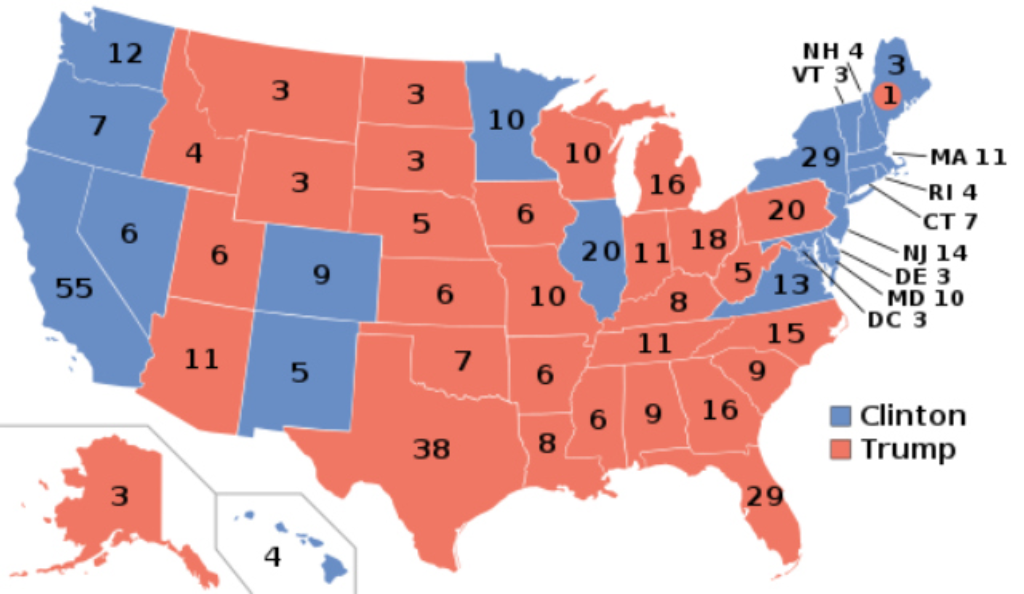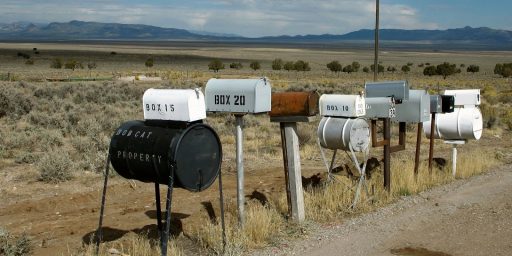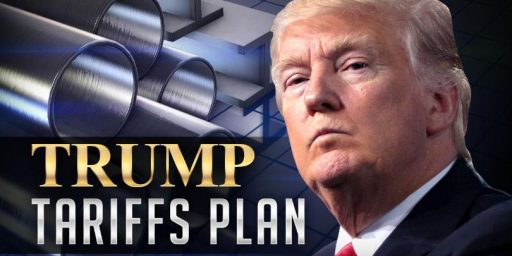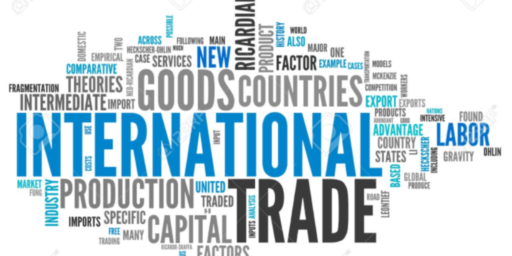Today in Terrible Electoral College Columns
No, abolishing the EC would not turn farmers into serfs.

Writing atUSAT, Trent England offers up the following defense of the Electoral College: Rural Americans would be serfs if we abolished the Electoral College. It starts as follows:
Should rural and small-town Americans be reduced to serfdom? The American Founders didn’t think so. This is one reason why they created checks and balances, including the Electoral College. Today that system is threatened by a proposal called the National Popular Vote Interstate Compact, or NPV.
For starters, the NPV is an attempt to have states award their electoral votes to the candidate who wins the national popular vote. More here.
At any rate, the paragraph is largely a non sequitur. One might as well ask whether the Founders wanted small farmers to be turned into kangaroos. The Electoral College wasn’t put into place to prevent rural/small-town American from being reduced to serfdom (nor were checks and balances created for that purpose). It was put into place as a political compromise because the Philadelphia conventioneers did not think national-level candidates would emerge to command majority support. Indeed, they thought the House would regularly choose the president. (For more on design, see previous posts here, here, and here).
BTW, if there are clauses in the Constitution that guards against serfdom, they are guarantees in Article I, Section 9: “No Title of Nobility shall be granted by the United States” and in Article IV, Section 4: “The United States shall guarantee to every State in this Union a Republican Form of Government.” The EC, however, was not about avoiding serfdom.
Beyond that, the entire way we think about urban v. rural would stagger the minds of the Founders. Note that in 1790, New York City had about 33,000 residents and Philadelphia about 28,000. Further, since most of the US population in 1789 would have been what we would today consider “rural” and “small town” the notion that the Framers would be especially worried about such people makes no sense. It is ahistorical to think that the Framers foresaw the massive differences between places like NYC (or DFW) and the countryside that we have today.
Beyond that, the road to serfdom that England foresees makes no sense:
Rural America produces almost all our country’s food, as well as raw materials like metals, cotton and timber. Energy, fossil fuels but also alternatives like wind and solar come mostly from rural areas. In other words, the material inputs of modern life flow out of rural communities and into cities.
This is fine, so long as the exchange is voluntary — rural people choose to sell their goods and services, receive a fair price, and have their freedom protected under law. But history shows that city dwellers have a nasty habit of taking advantage of their country cousins. Greeks enslaved whole masses of rural people, known as helots. Medieval Europe had feudalism. The Russians had their serfs.
First, a lot of food and energy production takes place in large states (e.g., California and Texas).
Second, agribusiness is very much controlled by corporations which are headquartered, typically, in cities. This is even more true of energy companies. It isn’t as if all food, energy, and raw material producers are small town operators/family farms. As such, the suggested dichotomy of rural producers and urban consumers is simply false.
Third, there is no reason to assert that only the EC creates a voluntary economic exchange between rural producers and urban consumers. By what logical argument would a popular vote system change that dynamic?
Fourth, why the appeal to ancient Greece, Medieval Europe, and Tsarist Russia? How does that prove that the EC protects rural citizens from enslavement by the cities? (Spoiler: it doesn’t). Indeed, if the hypothesis is that a popular vote for president leads to neo-feudalism, all one has to do is look at all other presidential systems (none of which use anything like the EC to elect their presidents) to test the hypothesis. Indeed, such a study would demonstrate the lack of serfdom in those countries.
The idea that every vote should count equally is attractive. But a quote often attributed to Benjamin Franklin famously reminds us that democracy can be “two wolves and a lamb voting on what’s for lunch.”
Actually, the idea that ever vote should count equally is fundamentally democratic and is, well, treating every citizen equally. And while the wolves v. lambs vote is pithy, it is ultimately nonsensical knowing what we empirically know about countries with popular vote systems (and nothing is more impressive that a “quote often attributed” to someone).
But the position that equality is bad is quite weird given the following concluding sentence:
All Americans should value constitutional protections, like the Electoral College, that remind us that the real purpose of government is to protect our individual rights.
How are individual rights upheld by treating one citizen as more powerful than another?
I understand the vague appeal of the idea that the EC somehow balances regions across the country. In reality, however, the EC treats citizens as unequal and it also takes away the voices of Americans both rural and urban because it looks only at the plurality position of the state.
There are a lot of rural voters in California. A lot of them voted Republican in 2016. Did their votes matter in the finally tally? No, because the EC only grants significance to candidate who can win the plurality of the vote in a given state.
If one is truly concerned about letting people be heard, don’t support a system that walls off their votes.
As a bit of postscript: the notion that food-producers should get special privileges in governmental representation comes up with some frequency, but it makes no sense. There is no reason to assume that farmers and the like would stop producing food if they had the same level of representation as everyone else. Indeed, if farmers and the like were truly so delicate as to need special treatment, we would pay a lot more for their output than we do. Yes, food is vital to our survival, but we still pay more for a good lawyer or engineer than a good farmer because, quite frankly, a good lawyer or engineer is harder to find. It is a basic fact of the market. (Go read Adam Smith).






Who the heck is Trent England? Per the blurb at USAT
I can’t quickly find much about OCPA. Their Save Our States project specifically targets the National Popular Vote initiative. Remember Doug’s conservatives are grifters all the way down post from a few days ago? There’s an odor of ALEC and Koch around Mr. England. I glanced at the comments on the article at USAT. No wonder democracy is in trouble.
This feels a lot like a school of writing that holds that it doesn’t matter if what you say is factual or makes sense, but only if it’s pithy and vivid. “Serf” is a lot more punchy than “have your interests poorly represented”.
In theory, the Senate should protect the interests of small population agricultural states. In practice, we’re in a trade war that’s landing heavily on those very states, and the Senate doesn’t seem inclined to do much to help them.
Anyway, thanks for this:
All too often the people actually responsible try to shift the blame to some “enemy” identified on the basis of geography or race or choice of beverage. “I’m not the one hurting you, it’s those terrible latte-sipping liberals” or whatever.
Oh, so much historical ignorance, to boot.
Serfs were little more than slaves, tied to the land of a lord, required to provide labor for said lord above and beyond farming (as in mines, construction, etc), and required to use the lord’s mills, presses and such as well, for a fee. Some, not all, could be sold or traded, with or without their parcel of land.
And whatever the Founders intended, the lack of a manorial system prevented serfs. But not slaves. Last I know, slavery coexisted just fine with the Electoral College.
Helots were very much like serfs in ancient Sparta. Not Greece. Sparta. there was really no such thing as Greece, or Hellas, in ancient times. It was a collection of independent, and often warring, city states which over time grew into larger states. They varied in government and levels of liberty, or lack thereof, and in culture. they just were capable of banding together against big threats(*), like Persia, and had enough common culture to hold events like the Olympic Games. The Helots outnumbered the Spartans by perhaps 5 or 7 to 1. some scholars cite this as a reason why Sparta became a militarized society: if every man is a warrior, the Helots would find rebellion most difficult.
But other parts of Greece had different political systems. Athens famously was a democracy, though slavery existed and women had neither voice nor vote. Serfs like the Helots were not the norm.
Moreover, serfdom ended with feudalism in most of Western Europe before any kind of democracy was established, and certainly before the US Constitution and Electoral College came into being.
I would give this article a prize for worse specious argument so far, except it’s not even specious. It’s flat wrong.
BTW Roman democracy had a mechanism a bit like the electoral college. the popular assembly voted on laws proposed by magistrates. The vote was by tribe. If there were 13 tribes, for example, a law needed the approval of six tribes to pass. Individual tribes voted in order. That is, first the members of Tribe 1 cast their votes, these were tallied and the result announced. then it was the turn for Tribe 2, and so on. When enough tribal votes were in favor, or against, a law, the voting stopped, as the result wouldn’t be changed.
So it’s not the same, and tribes each had one vote regardless of how many people voted in one, and they were not of equal size. But you can see how the popular vote could be for a law and the tribal vote against it.
(*) Not all Greek cities joined in an alliance against Persia. Some Greek colonies and independent city states in Asia Minor joined the Persian Empire.
It seems more than a little dishonest to say,
without mentioning that the EC no longer works remotely like the founders wrote into the Constitution.
Also worth pointing out that four of our first five presidents came from Virginia, which just so happened to be the most populous state in the union for the first few decades of our country’s history. So if that was indeed the goal then they did a lousy job.
Indeed…so many modern day “serfs” probably work for and/or are hurt by the anonymous backers of organizations like ALEC…if this England person is so worried about serfdom, perhaps he should investigate those who fund the OCPA…it’s always projection and misdirection with these people…
The US doesn’t have a national popular vote for president. Never has. Each state has an election and the EC is the system of finding the “winner” from the various state level elections.
A vote cast in Virginia has no bearing on any vote cast in any other state. This nonsense about some state having more or less say in the election is just ignorance being applauded and needs to stop.
The states created the federal and THE STATES and their voters elect the President.
Why should one state be more powerful than another?
Why should a State with all it’s power (except for “external objects” and very limited Enumerated Powers) relinquish that power to the most populous states?
We are guarantee a Constitutional Republic not a Democracy so FEARED by our Founders. See this one example from John Adams. Other Founders fears were similar.
______________________
Democracy has never been and never can be so durable as aristocracy or monarchy; but while it lasts, it is more bloody than either. … Remember, democracy never lasts long. It soon wastes, exhausts, and murders itself. There never was a democracy yet that did not commit suicide. It is in vain to say that democracy is less vain, less proud, less selfish, less ambitious, or less avaricious than aristocracy or monarchy. It is not true, in fact, and nowhere appears in history. Those passions are the same in all men, under all forms of simple government, and when unchecked, produce the same effects of fraud, violence, and cruelty. When clear prospects are opened before vanity, pride, avarice, or ambition, for their easy gratification, it is hard for the most considerate philosophers and the most conscientious moralists to resist the temptation. Individuals have conquered themselves. Nations and large bodies of men, never.
John Adams, The Letters of John and Abigail Adams
@gVOR08:
In a Constitutional Republic Democracy is intended to always be in trouble.
Perhaps you might show us where the word Democracy is written in our Constitution or in any of the 50 State Constitutions, much less guaranteed as our Republican form is in Article IV Section 4 clause 1?@gVOR08:
@Chip
I honestly don’t understand what you’re trying to communicate here. California has 55 Electors, which is more than 20 percent of the 270 votes needed to elect a President. Alaska, DC, Delaware, Montana, North Dakota, South Dakota, Vermont, and Wyoming each have 3 Electors.
@Bob:
This really isn’t true. First, the federal government created 37 of the 50 states. Second, we established rather clearly with the Civil War and the 14th Amendment that we’re a union, not a collection of states.
The stupid, it hurts.
@Bob: States don’t vote. People do
I’ve been bingeing on You-Tube videos of Dr Timothy Snyder (History/Yale–“Bloodlands”–that guy) the past few weeks. Anyone who hasn’t run across his interpretation of our present mess should reserve an hour or two and watch his videos about “On Tyranny” or “Road to Unfreedom”.
This Trent England article (op-ed?) is a purely distilled example of what Dr Snyder would call the NeoFascists’ use of language. There is ALWAYS a threat. It is ALWAYS a version of the same threat. There are no lessons to be learned, no wisdom to be gained but only the constant danger. There is no safety in the State. The REAL nation has to be protected from the corrupt and corrupting State.
The England op-ed takes that theme and applies it to the present American divide between places with cows and places with BMW dealerships and turns it toxic. Are we certain it didn’t come from St Petersburg Russia?
From a logical and pragmatic perspective I agree.
Taken as a moral arguement it makes more sense. Putting on my cultural analysis hat, it nicely does three things: first it call back to the founding Farmers legend (I.e. that most/all if the key founders and revolutionaries were Farmers who reluctantly were called to greatness). It also speaks to a certain frontiersmen as the real Americans.
Most importantly, it sets up a “rural/makers” and “urban/takers” moral opposition. And in a Weberian/Randian read, clearly makers are always seen as more deserving of special treatment.
@Paine:
While this information was in my brain, it never occurred to me in this way. Excellent point.
@Bob: Adams feared “democracy” as defined by Plato and the Greeks, which was rule by the mob/the poor.
@mattbernius: I certainly get the narrative appeal. Although even as part of a maker/taker tale it ignores utterly what the urban centers make for the rural folks.
But yes, there is an appeal to myth and legend inherent in all of it.
One rationale commonly heard is “Without the Electoral College, California and New York would decide every election?” This brings to mind a saying I heard many years ago: “Lotteries are a tax on people who are bad at math.” I would update it in this context by simply saying “Innumeracy is a terrible thing.”
In the first election I was permitted to vote, Mondale won Minnesota. Not much talk of the EC that night, boy-howdy. The EC rubs the U.S. the wrong way in the present mostly due to the false red/blue divide that allows winners of all the votes to be sent home.
The dam is now over-topping. The tell is the behavior of Republicans: Deer in the Headlights. 2020 will not be kind to them.
At the risk of incurring the wrath of all here, no one is going to be turned into a serf by abolishing the EC. What is most likely to happen–and mostly limited to the race to the White House–is that the focus of the campaign will shift from however many swing states are leaning magenta to 15 or so metropolitan areas that–currently–lean more purple than magenta. Neither focus makes the system more “democratic” except to the extent that the party that favors magenta shifts it’s policy choices to eroding the purple tendencies of these metro areas. Whether such a shift would be beneficial to the nation at large, I will leave to greater minds–the unintended consequences of such a shift seem too daunting for me. I got no dog in this fight at all, but I will say that I’m inclined to see the interest/disinterest in NPV as correlated to the degree that one sees advantage in the purpleness of those major metropolitan areas.
@The abyss that is the soul of cracker: Any shift that makes candidates to realign their strategies to amassing a majority of votes, rather than playing a game swing states, is a net plus from a (small d) democratic POV.
Another thing that proponents of the EC miss is historical cases of majoritarian pushback against outsized minority power. The Sri Lankan Civil War was caused in part because the minority Tamil enjoyed benefits that the majority Sinhalese didn’t have access to. I for one am tired of being treated like a second-class American when it comes to election outcomes and I bet a lot of liberals share my frustration. For the sake of the union, changes should be made.
@SC_Birdflyte:
Common though.
@Steven L. Taylor: Agreed, but I think that says more about their ideologies than it does about anything else.
@The abyss that is the soul of cracker:
Well we wouldn’t want to end up with a system that elects billionaires from New York or California actors.
You missed the point of Mr. England’s article. The Founding Fathers of this country KNEW that if the President were elected by popular vote, then the high population urban centers (which are now largely democrats) would elect the President. Remember, the President is elected by STATES, NOT the people. If the Electoral College were abolished, then ALL “serf” states would be under the thumb of the urban centers and never have a say in what happens. Also, the NPV is *probably* unconstitutional for two reasons: 1) It negates the intent Electoral College, which violates the Constitution. 2) What happens if a state is a member of the compact, and its citizens voted a majority for one candidate, but the other candidate won the country popular vote? Under this scenario, the state not only negates the Electoral College, it negates THE MAJORITY VOTE OF ITS OWN CITIZENS!
@Jenny Wilson:
Considering the Framers of the Constitution never could have conceived of cities the size of LA or Houston, I don’t think this entered their thinking at all (nor did they conceive of population disparities between states of the type we have now). It really is utterly impossible to ascribe this argument to the Framers.
The intent was that the House would regularly choose the president. It is clearly the case that the EC has never functioned as intended (just see the Federalist Papers).
And, regardless, the “intent of the Framers” is not sacrosanct. The EC clearly treats different voters differently. It is patently unfair. And it does not protect “small states” nor “rural voters”–rather, it empower swing states.
While I have concerns about the NPV, and I have sincere doubts it will ever come to pass (and this post is not really about the NPV), I will note that a state has the constitutional right to assign the electors as it chooses:
-Article II, Section 1.
The real constitution barrier to the NPV is in Article 1, Section 10 which states “No State shall, without the Consent of Congress…enter into any Agreement or Compact with another State”
This would suggest the NPV would have to be approved by Congress, and that seems unlikely.
@Jenny Wilson: Also, I will reiterate the following from the post:
This is an empirical question that can be easily assessed.
@Jenny Wilson: One more point: as Paine noted above, 4 of the first 5 presidents all came from Virginia, the largest state at the time (Washington, Jefferson, Madison, and Monroe). Of the first six, the other two were from another larger state, Massachusetts (Adams and John Quincy Adams).
If the Framers were really concerned about the dominance of large states over the process, surely they should have been disturbed by that outcome (and yet, they were not).
@Chip: Completely, utterly, unbelievably ignorant and inaccurate. Probably intentional. California has a population of 40 million, and 55 Electoral College votes. That’s the same population of the 22 smallest states combined. But those 40 million people get to cast 99 Electoral College votes. So the votes of those states have almost TWICE the influence of a vote in California. California has 70 times more people than Wyoming, yet its influence on the election is less than 20 times greater. Thus, a voter in Wyoming has FOUR TIMES THE INFLUENCE of a voter in California.